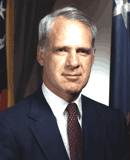Schlesinger Report
The Schlesinger Report, originally titled A Review of the Intelligence Community, was the product of a survey authorized by U.S. President Richard Nixon late in 1970.
[1] The objective of the survey was to identify and alleviate factors of ineffectiveness within the United States Intelligence Community (IC) organization, planning, and preparedness for future growth.
The report highlighted two "disturbing phenomena" within the IC: an "impressive rise in ... size and cost" and the "apparent inability to achieve a commensurate improvement in the scope and overall quality of intelligence products.
"[2] The report analyzed issues pertaining to organizational fragmentation, lack of interagency centralization, costly emerging technologies, duplication of collection and analysis, and institutional disorganization, and offered the administration several practical options for improving IC functions.
Nixon and his National Security Advisor Henry Kissinger initially viewed the IC, particularly the Central Intelligence Agency (CIA), with condescension, believing it was not sharing important information with the administration.
[3] Since little evidence indicated a direct correlation between intelligence expenditures and quality outputs, Nixon commissioned James Schlesinger to conduct a survey of the IC.
Schlesinger referred to the production phase of intelligence as the "stepchild of the community", in which analysts "with a heavy burden of responsibility, find themselves swamped with data" at a time when new hypotheses needed to be tested, particularly regarding the USSR.
The lack of solid leadership stemmed from "the failure of the National Security Act of 1947 to anticipate the 'constitutional' needs of a modern and technologically complex intelligence community".
In this section, he made several observations regarding the difficulties of budget cuts and restructuring: Schlesinger concluded that, while cutbacks should be pursued, significant budgetary reductions should not be endeavored until reorganization has proven successful.
